Immigration

In a time when bipartisanship seems like a forgotten dream, it is important for us to find and celebrate cases of lawmakers coming together, regardless of party and ideology, to address the many real and immediate challenges we face as a country. Especially on issues of importance to the faith community, we should encourage bipartisan cooperation that seeks justice and mercy for families, communities, and those otherwise marginalized across our nation. Recently, there have been two steps forward on this front, especially with regard to the work that Sojourners has been doing on immigration, poverty, and racism.
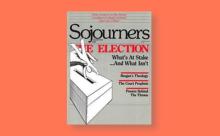
OUR GOVERNMENT HAS taken the stance that Salvadoran “illegals” are economic, not political, refugees, and therefore have no right to be here. Despite stories and statistics to the contrary, our government doesn’t believe they have a “well-founded fear of persecution” that would entitle them to political asylum here. Meanwhile refugees keep coming with the same story of their government’s organized killing and repression. Where are our ears to hear and to respond? I am appalled at the inhumanity I see. I am standing in the belly of the beast, a monster we’ve created. ...
The core that sustains me is the still, small voice. It is God whom I wish to hear.

Apart from slogans, nothing seems different but license plates, laws governing cell phone use in moving vehicles, and the ability to buy liquor locally. If not for signs informing you of your whereabouts, you would not know the exact state you’re in. The mimosas bloom their otherworldly silken blossoms without deference to zip code. Catalpa leaves cascade like oversized green hearts from massive branches. Steeples rise from Baptist churches alongside Dollar Generals and barbecue places named for the folksy characteristics of those who ostensibly manage the pits. Heavy’s. Bubby’s. Grateful Ed’s. All of these things, the sweet smoky same, regardless of state line
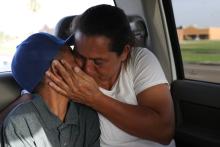
Marroquin Perdomo gave her son a set of colorful handmade cards she had made for him in detention. On one of them, she had drawn flowers surrounding a Bible verse – Salmos (Psalms) 121:8.
It reads in English: “The Lord will watch over your coming and going both now and forevermore.”
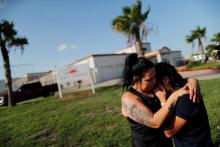
Chad Belew, pastor of The Arsenal, a non-denominational church south of downtown San Antonio, understands the pressure to keep a low profile on political issues or run the risk of alienating his congregation. But he also believes that silence is deadly, spiritually speaking. He quotes Martin Luther King, Jr. “Our lives begin to end the day we become silent about things that matter.”
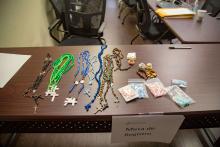
Parents who have just been reunited with their children — after being separated, some for months, amid the implementation of the Trump administration’s “zero tolerance” immigration policy — are offered food, clothes, toys, and other essentials and are paired with background-checked volunteers to help them through the next steps of the process.

Chancellor Angela Merkel's Bavarian allies, who are pressing her to toughen up immigration policy, should remember their Christian roots and show a sense of responsibility toward the poor and weak, the head of the Catholic Church in Germany said.

![]() The idea of humanity, excluding no one, Arendt wrote, “is the only guarantee we have that one ‘superior race’ after another may not feel obligated to follow the ‘natural law’ of the right of the powerful, and exterminate ‘inferior races unworthy of survival.’” As she herself witnessed, the first steps are the abrogation of minority rights and the refusal of asylum to refugees.
The idea of humanity, excluding no one, Arendt wrote, “is the only guarantee we have that one ‘superior race’ after another may not feel obligated to follow the ‘natural law’ of the right of the powerful, and exterminate ‘inferior races unworthy of survival.’” As she herself witnessed, the first steps are the abrogation of minority rights and the refusal of asylum to refugees.
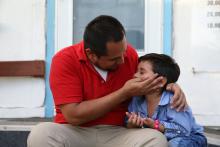
"They took the children from us without any explanation," said Isabela, who asked that only her first name be used. "I felt I had lost her, that I could not find her."
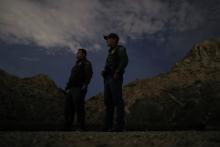
All data indicate that undocumented migration from Mexico, in particular, has ended and at this point more unauthorized Mexicans are leaving the country than entering it. According to estimates from the Pew Hispanic Center, the Center for Migration Studies and the Department of Homeland Security, the undocumented Mexican population stopped growing in 2008 and has been trending downward ever since.

RAICES Texas — the San Antonio-based immigration legal services provider that has received tens of millions of dollars via a viral Facebook fundraising campaign launched amid the family separation crisis at the border — today announced a plan to distribute $20 million of their funds: give it over to the Department of Homeland Security to “post bonds” for mothers being held in detention.
1. Women Faith Leaders Bear Witness at the U.S.-Mexico Border
“Gloria Anzaldúa famously referred to the U.S.-Mexico border as una herida abierta — an open wound. … But if the border is a wound, then perhaps we can best describe our nation as doubting Thomas before his encounter with Christ.”
2. Americans Are Having Fewer Babies. They Told Us Why.
From The New York Times. Spoiler alert: Babies are expensive.
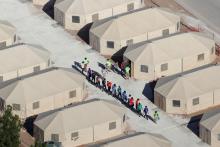
U.S. Judge Dana Sabraw in San Diego last month ordered the government to stop separating children from immigrant parents entering the United States illegally and set deadlines for the government to reunite families.
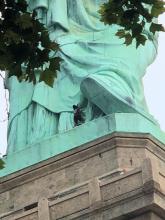
A New York woman was due to be arraigned in federal court on Thursday, a day after she scaled the stone pedestal of the Statue of Liberty to protest immigration policy.
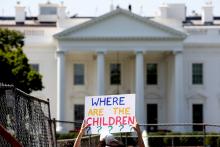
It is time for people of faith and conscience to demand nothing less than an immediate and complete reunification of separated families — and demonstrate our willingness to play a role in this process. We have spoken out to stop the separation, but we still have the moral imperative to fix it for those who have been torn from their parents. I have recently been in meetings with bipartisan groups of senators who want to see this issue fixed, who care very deeply about finding lasting solutions, and who are asking for the help of the faith community.
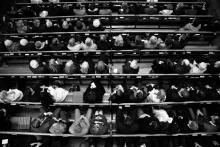
But once back in America, these very same Christians will adamantly oppose having “foreigners” as neighbors, loathing the idea that they could possibly be allowed to cross into the border of the United States seeking a better life. So while they post pictures on social media of themselves surrounded by poor children and holding babies they personally cared for, they’ll post nothing about the children and babies being separated from their parents at the border.
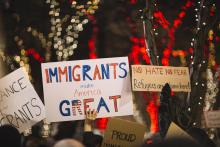
We in the church have clung too tightly to our country’s myths of exceptionalism. We’ve been too slow to name the real “terror within” and unwilling to listen to those telling us of terror all around. We’ve been reluctant to own up to our history and speak out against unjust policies . We don’t like to think or talk about it, but most of us know that our quality of life here comes directly at the expense of everyone else on the planet (not to mention the planet itself), millions of ordinary folks whose countries have been ravaged by centuries of colonialism and persistent neocolonial structures, who make our clothes and gadgets, grow our food and coffee, and pay in countless other ways for all our out-of-control consumption and addictions. Their problems are our problems. So we can’t set them aside.
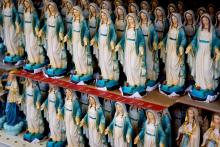
When we lose our dreams
To be educated
And are afraid
Of being incarcerated
We pray to you
Dios te salve, María,
When we don’t know
Where to go
To be a Sitting Bull
Or a Standing Rock
We pray to you
llena eres de gracia,
When your naturaleza
Showed us no mercy
And the politicians
Shut down our Borinquen
We pray to you
el Señor esta contigo.
When we’ve picked
All the grapes
Without an actual
Bathroom break
We pray to you
Bendita eres
When our hermanas Negras
Are being maimed
And ashamed
By racism, sexism, bigotry
We pray to you
entre todas las mujeres,
When we fight for
Farm workers’ rights
While hiding from
Our men’s grips at night
We pray to you
y bendito es el fruto

More than 10,000 protesters gathered at Foley Square in downtown Manhattan Saturday morning to march against the Trump administration’s policy on immigration. The New York march was part of a nationwide series of rallies organized by advocacy groups, legal and immigrants’ rights organizations, trade unions, and concerned citizens.

Thousands of protesters clad in white and armed with signs denouncing President Donald Trump rallied Saturday in more than 90-degree heat against the Trump administration’s immigration policy and the “zero-tolerance” approach that has separated children from their parents after they crossed the border from Mexico to the U.S.